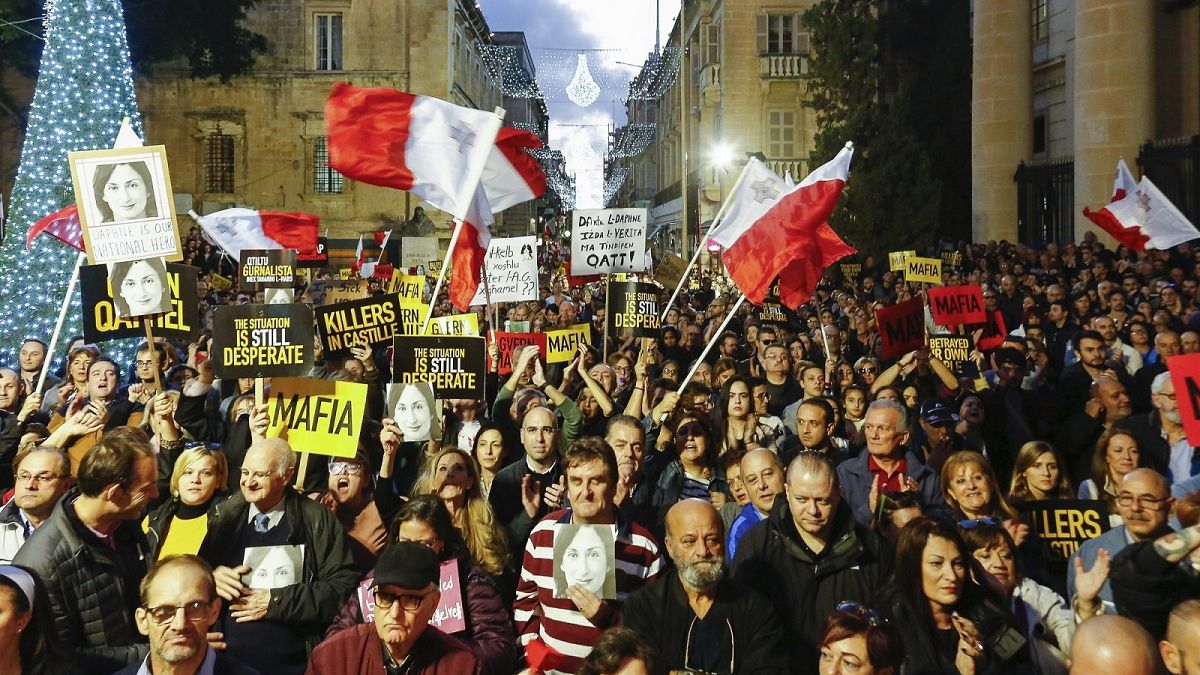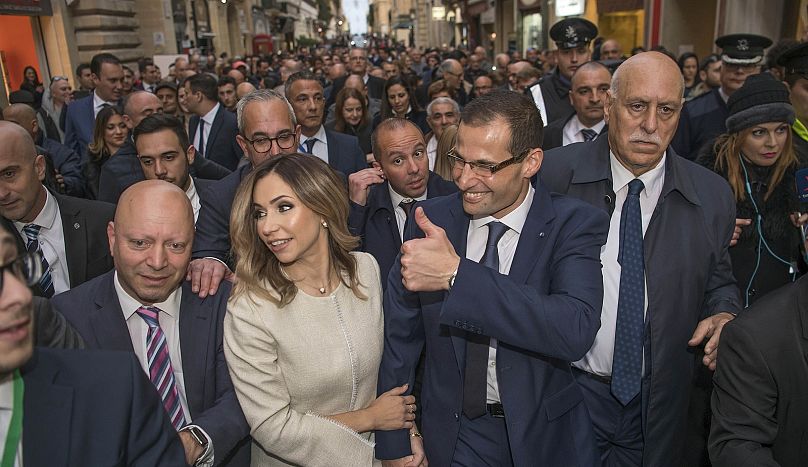New prime minister Robert Abela has been in power in Malta for a year since his predecessor resigned under public pressure. Critics think not much on the island has changed.
As much of the world contends with the deepening impact of the coronavirus pandemic, the choice of slogan by Malta's Partit Laburista - or Labour Party (PL) - to mark Robert Abela's first year in office seems particularly fitting for such a historic period: "Sena Deciziva," or "decisive year".
For the party itself, it has been a time of renewal under a new leader and prime minister who assumed power when his predecessor, Joseph Muscat, was ousted from office on January 13, 2020, after months of protests.
Muscat, who had been prime minister since 2013, had become a controversial figure in the wake of the murder of investigative journalist Daphne Caruana Galizia when connections between Muscat, his chief of staff, two cabinet ministers and those accused of her murder were allegedly exposed.
Killed in October 2017 when a bomb planted in her car exploded, Caruana Galizia had uncovered alleged corruption at the highest echelons of the Maltese political system, including links between politicians and the criminal underworld.
Muscat was forced from office in the face of public anger over the handling of the investigation into her assassination, ushering in a new figurehead at the helm of a new Labour government.
As another Labour politician Harold Wilson once quipped, a week is a long time in politics. So, what difference has a year made in Malta?
'Muscat without the economic success'
"I don’t think much has changed," Carmel Cacopardo, leader of the AD+PD - The Green party, told Euronews.
"In fact, Abela represented himself as the continuity candidate in the election to contest the vacancy left by Joseph Muscat, in stark contrast to his opponent who was proposing to have a clean slate."
His is not an isolated opinion.
Manuel Delia, an executive committee member of Repubblika, the civil society movement which orchestrated the protests calling for Muscat's removal, for one agrees.
"There hasn’t been any material consequence for the wrongdoing for which they [Muscat and his ministers] resigned. And it is giving them confidence in their public appearances to deny any wrongdoing," he said.
"Although the whole edifice collapsed last year, there are no apologies, no regrets, and this is important for Robert Abela’s government," Delia argued.
"If they apologise too much, if they acknowledge there was wrongdoing, then they have a serious political problem because they are the people who propped it up. Most ministers of today’s government were ministers in Joseph Muscat’s government."
While public displays of dissent have been muted due to pandemic-related restrictions, Caruana Galizia's murder still casts a long shadow in Malta, despite the best efforts of the new government to dissociate itself from the institutional crisis it provoked.
Abela, marking his first year as premier, addressed the nation on Monday, just a day after a poll showed his trust ratings had slumped to the lowest since he took office.
"The headline that has come out of that was: ‘In the past year, I have been honest as has my government.’ It’s significant that he needs to say that," said Delia.
For him, the change of leadership has not drawn a line under the island state's ongoing political upheaval.
"It’s very much Joseph Muscat without the economic success. It is a continuation of Joseph Muscat’s policies and attitudes without the economic success," argued Delia.
Despite external pressure from the European Union to implement judicial reforms and act on alleged corruption and meritocracy, Abela's rise to prime minister hasn't accelerated reforms over the last 12 months.
"The only changes made were those forced upon him, whether by circumstances or by foreign associations who are pressing for reform, particularly the Venice Commission who have been pressing on for the rule of law and various other reforms, some of which have been carried out, others not," said Cacopardo.
Stymied by the system
According to a Eurobarometer poll published in June 2020, some 89 per cent of Maltese believe corruption on the island is widespread, an increase of 10 points since the last general election in 2017.
In spite of this, polls have consistently shown the Labour Party with a commanding lead over rivals the Nationalist Party (PN). It is this seemingly impregnable position on Malta's political landscape, according to Delia, that emboldens the PL to drag their heels on implementing reforms.
"It is that electoral confidence that gives them a sense of impunity that they don’t owe anyone an explanation and that people continue to get away with matters that were exposed that forced the resignations last year," said Delia.
"They don’t need to manage their relationship with the public because the majority of the public continues to support them".
An ineffectual opposition, Cacopardo and Delia both agree, is partly to blame for Labour's dominance but the election of a new leader, Bernard Grech, in October has seen the PN rebuild support and close the gap on the PL.
While pressure from the EU has helped with keeping judicial reforms on the agenda, keeping the momentum going to reform Malta's political system is next to impossible, according to Delia.
"We now have far fewer allies. The political parties, whether in government or opposition, are by and large happy with the institutional status quo because they get turns to rule alone and now we are acting outside of that space," he said.
"Since everything has been seen in twos here in Malta, any criticism of the government can easily be perceived as serving the interests of an opposition."
The two-party system, which Cacopardo argues has become ingrained in the island's DNA, also means that other political voices for change are shut out.
The result of a merger of two parties - the Democratic Alternative (AD) and the Democratic Party (PD) - in September 2020, AD+PD has effectively become Malta's third-largest party. Under the current system, though, the party, which in the most recent polling hovered on 1.8 per cent of the vote, has long been denied representation in the country's parliament.
Those dissatisfied with the status quo have rallied under the party's banner but electoral challenges remain an obstacle.
"We do have that support but it does not always translate into votes," said Cacopardo. "One of the major handicaps is the broadcasting situation where the state broadcaster supports the government and the large political parties have their own TV station and their own radio station. And that is another severe handicap which lessens, that decreases substantially our ability to communicate".
Daphne's positive legacy
Besides the parliamentary system solidifying power in the hands of two establishment parties, social and civic activism is still a nascent concept on the island.
"Malta has a very weak tradition of civil society campaigning in issues of democracy," said Delia. "Here, traditionally, we align on what political party can take us from the other. So, I would say that the emergence of civil society in this area is one of the few positive legacies, if you want to call it that, of Daphne Caruana Galizia".
Repubblika as a fledgling movement largely coalesced in the void left by Caruana Galizia and her independent journalism. Officially formed in January 2019, the movement had turned protests about the handling of her murder investigation from low key affairs to marches on the streets of Valletta attended by tens of thousands within ten months.
Change is coming but its pace is so slow it is perhaps imperceptible to all but those pushing for it. Repubblika and political parties like AD+PD have advocated for reforms but it is an uphill battle against what is perceived to be a well-oiled political machine and a partisan media.
"What we need is the possibility that, whichever government is in power, there is a conscience out there that is independent of partisan motivations that is trying to get them to see - and to get the public to see - what is wrong," said Delia. "This is what Daphne did on her own."
Euronews contacted the prime minister's office and the PL but neither had responded at the time of publication.
Every weekday at 1900 CET, Uncovering Europe brings you a European story that goes beyond the headlines. Download the Euronews app to get an alert for this and other breaking news. It's available on Apple and Android devices.

